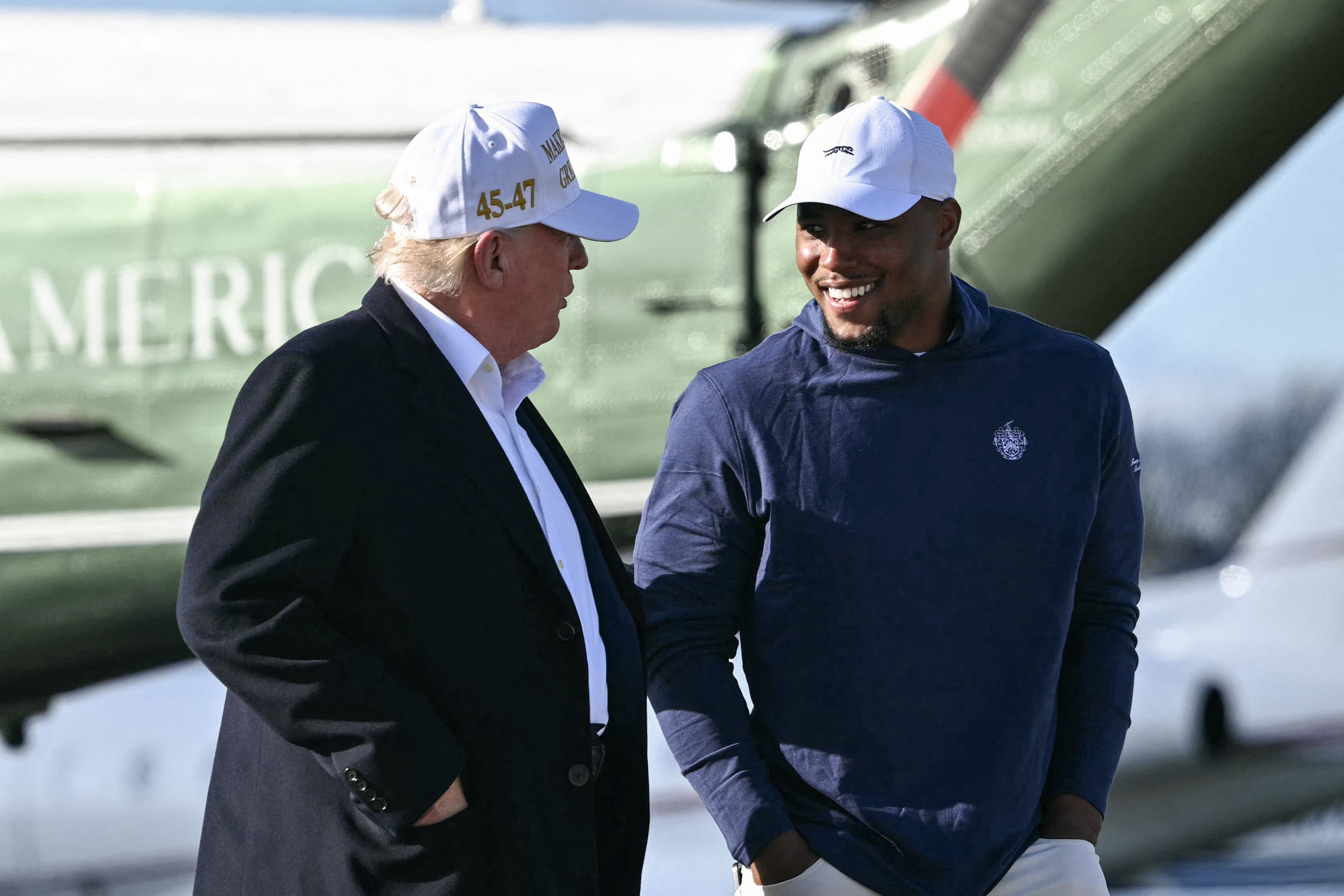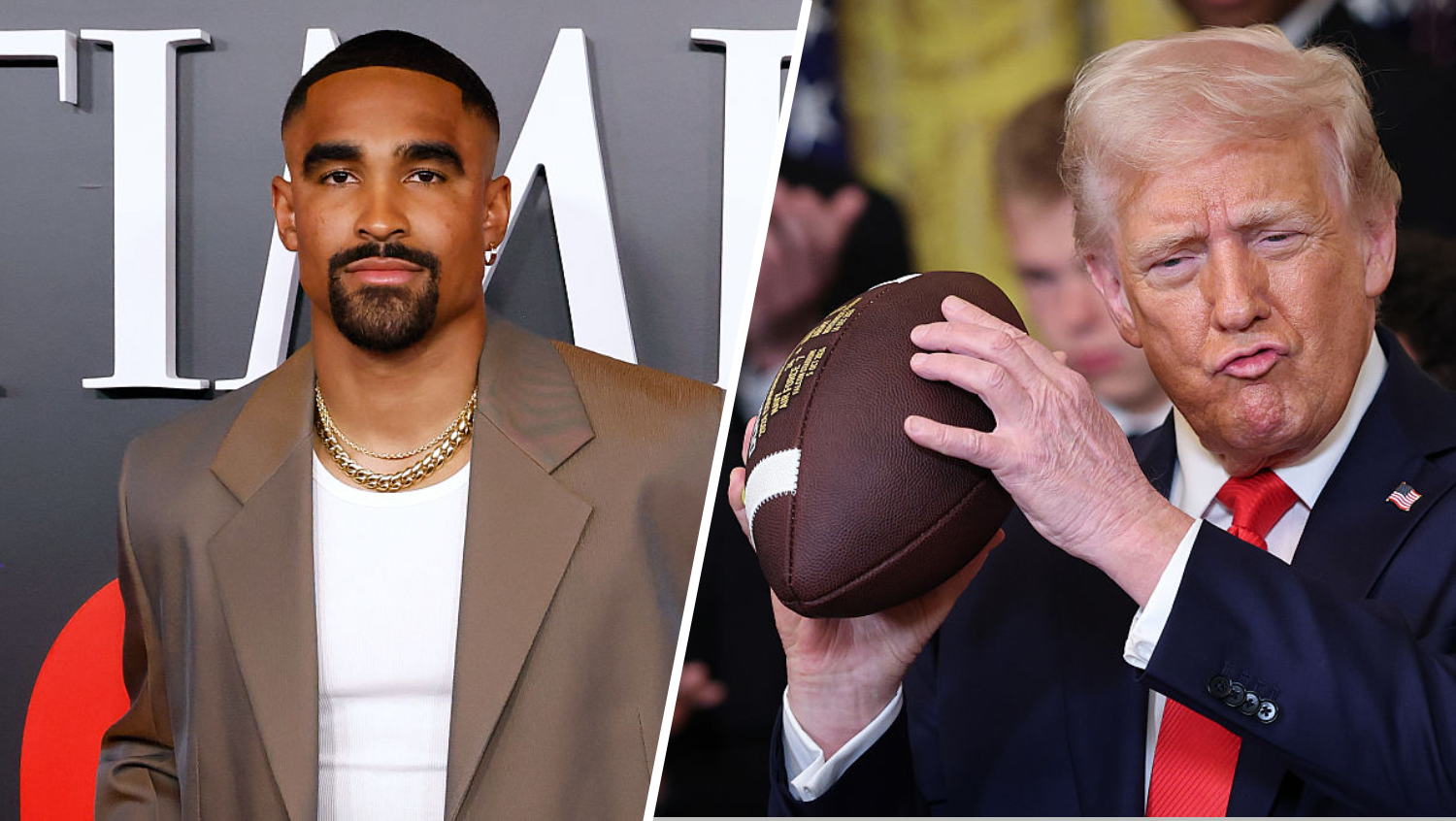Saquon Barkley Trump Visit: Eagles Star Responds to Backlash
Saquon Barkley's Golf Outing: Eagles Star Responds to Trump Visit Backlash
Introduction: From Fan Favorite to Facing Fire
Until recently, Philadelphia Eagles' newest weapon, Saquon Barkley, seemed practically immune to criticism. The star running back, known for his explosive plays and infectious smile, was a universally loved figure. But the honeymoon period appears to be over, at least for some. A seemingly innocent Sunday golf outing has landed Barkley in a whirlwind of controversy. What happened? Let's dive in and see why a simple round of golf sparked such a strong reaction.
The Day That Sparked the Storm: Golfing with Trump
The controversy erupted when it became public knowledge that Saquon Barkley spent part of his Sunday playing golf with former President Donald Trump at Trump National in Bedminster, New Jersey. Following the round, Barkley reportedly flew back to Washington, D.C., with Trump on Marine One. This seemingly innocuous event sent ripples through social media, igniting a firestorm of debate and criticism.
Social Media Erupts: The Backlash Begins
News of Barkley's golf outing spread like wildfire across social media platforms. While Barkley hasn't publicly endorsed any political candidate throughout his career, the mere association with Trump was enough to trigger a wave of negative reactions from some fans and commentators. The criticisms ranged from disappointment to outright anger, highlighting the deeply polarized political climate we live in.
Barkley Responds: Addressing the Controversy on X
Faced with the rising tide of criticism, Saquon Barkley took to X (formerly Twitter) to address the situation directly. His response, while brief, offered a glimpse into his perspective. He stated that some people were “really upset” that he “golfed and flew to the White House with the PRESIDENT.” He then added, "Maybe I just respect the office, not a hard concept to understand. Just golfed..." (content truncated for brevity).
Decoding Barkley's Response: Respect for the Office?
Barkley's statement emphasizes respect for the office of the President, regardless of the individual holding that position. This suggests that his decision to golf with Trump was not necessarily an endorsement of Trump's political views or policies, but rather a demonstration of respect for the highest office in the land. Is this a reasonable explanation? Or is it a cop-out?
The Neutral Stance: Is it Possible?
In today's hyper-political environment, maintaining a neutral stance can be incredibly difficult. Every action, every association, is often scrutinized and interpreted through a political lens. Can athletes truly separate themselves from politics? Or are they inevitably drawn into the fray?
Why the Outrage? Understanding the Underlying Tensions
The backlash against Barkley highlights the deep divisions that exist within society. For many, associating with Trump, regardless of the context, is seen as a tacit endorsement of his controversial policies and rhetoric. The outrage isn't necessarily about golf; it's about the perceived implications of aligning oneself with a figure who elicits strong emotions on both sides of the political spectrum. Politics has now invaded all aspects of our society.
The Dilemma of Public Figures: Navigating Political Waters
Athletes and other public figures face a constant challenge in navigating the political landscape. Any statement or action can be interpreted and amplified, potentially alienating a significant portion of their fan base. How can they express their views without facing backlash? It's a tightrope walk with no easy answers.
The Pressure to Speak Out: Silence is Compliance?
On the other hand, many feel that public figures have a responsibility to speak out on important social and political issues. Silence, in their view, is a form of complicity. The pressure to take a stand can be immense, but so can the consequences of doing so.
Impact on the Eagles: Will this Affect Team Dynamics?
The question now arises: how will this controversy affect Saquon Barkley's relationship with the Philadelphia Eagles and its fanbase? Will the backlash be short-lived, or will it linger throughout the season? Team chemistry and fan support are crucial for success in the NFL. Will this incident create a rift between Barkley and some of his teammates or fans?
The Business of Sports: Balancing Image and Endorsements
For athletes, image is everything. Endorsement deals are often contingent on maintaining a positive public perception. A political controversy could potentially jeopardize these lucrative partnerships. Will Barkley's sponsors stand by him? Only time will tell.
Comparing to Other Cases: When Athletes Face Political Scrutiny
Barkley is not the first athlete to face scrutiny for their political associations. Throughout history, athletes have been praised or condemned for their political stances. Think of Colin Kaepernick, LeBron James, and Muhammad Ali. Each case serves as a reminder of the power and responsibility that comes with having a public platform. What separates this event from those past experiences?
The Kaepernick Effect: A Lasting Legacy
Colin Kaepernick's kneeling protest sparked a national debate about racial injustice and police brutality. While his actions were widely criticized by some, they also inspired many others to speak out and demand change. His legacy continues to shape the way athletes engage with political issues.
Moving Forward: Can Barkley Rebuild Bridges?
The path forward for Saquon Barkley involves navigating the complexities of public opinion and regaining the trust of fans who may feel disappointed or betrayed. It's a test of his character and resilience. Can he successfully weather the storm and emerge stronger on the other side?
The Power of Action: Demonstrating Commitment
Ultimately, Barkley's actions will speak louder than words. If he can demonstrate a genuine commitment to social justice and community engagement, he may be able to rebuild bridges and repair his reputation. The ball is now in his court. Showing respect and concern to those that feel slighted may go a long way.
Conclusion: A Lesson in Public Perception
Saquon Barkley's experience serves as a stark reminder of the intense scrutiny that public figures face in today's polarized world. The seemingly simple act of golfing with a former president has ignited a complex debate about politics, respect, and the responsibilities of athletes. Whether this incident will have a lasting impact on his career remains to be seen, but it undoubtedly offers a valuable lesson in navigating the treacherous waters of public perception.
Frequently Asked Questions (FAQ)
Here are some frequently asked questions regarding Saquon Barkley's recent controversy:
- Why is Saquon Barkley's golf outing with Donald Trump causing such a stir?
The controversy stems from the highly polarized political climate, where any association with Trump is seen as a political statement, regardless of intent.
- Did Saquon Barkley endorse Donald Trump by golfing with him?
Barkley has not publicly endorsed Trump or any other political candidate. His statement suggests he was merely showing respect for the office of the President.
- How might this affect Saquon Barkley's career with the Philadelphia Eagles?
The impact on Barkley's career is uncertain. It could potentially affect his relationship with some fans and teammates, as well as his endorsement deals.
- What can Saquon Barkley do to address the controversy?
Barkley can demonstrate a commitment to social justice and community engagement, and show remorse to fans who feel his actions went against their beliefs.
- Is it fair to expect athletes to remain neutral on political issues?
Whether it's fair is subjective. Some believe athletes have a responsibility to speak out, while others believe they should remain neutral to avoid alienating fans.

